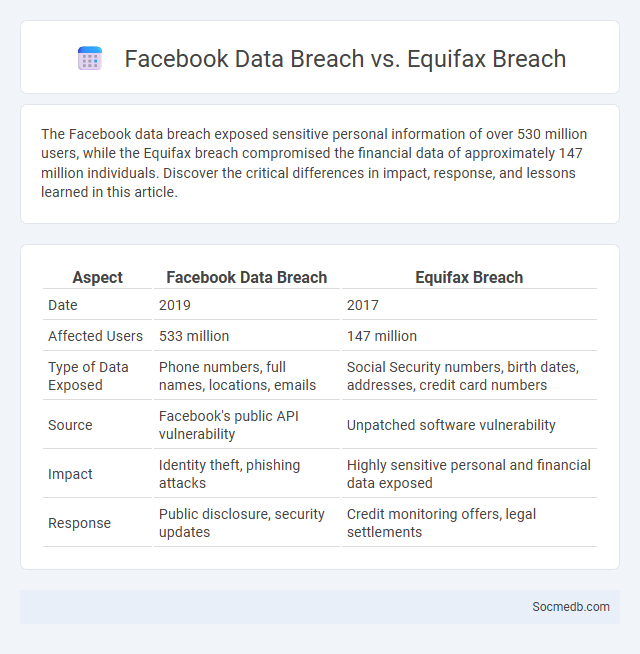
Photo illustration: Facebook Data Breach vs Equifax Breach
The Facebook data breach exposed sensitive personal information of over 530 million users, while the Equifax breach compromised the financial data of approximately 147 million individuals. Discover the critical differences in impact, response, and lessons learned in this article.
Table of Comparison
| Aspect | Facebook Data Breach | Equifax Breach |
|---|---|---|
| Date | 2019 | 2017 |
| Affected Users | 533 million | 147 million |
| Type of Data Exposed | Phone numbers, full names, locations, emails | Social Security numbers, birth dates, addresses, credit card numbers |
| Source | Facebook's public API vulnerability | Unpatched software vulnerability |
| Impact | Identity theft, phishing attacks | Highly sensitive personal and financial data exposed |
| Response | Public disclosure, security updates | Credit monitoring offers, legal settlements |
Overview of Major Data Breaches
Major data breaches in social media platforms have exposed millions of users' personal information, including email addresses, phone numbers, and private messages. High-profile incidents on Facebook, Twitter, and LinkedIn highlight vulnerabilities in data security and the importance of protecting user privacy. You must remain vigilant and regularly update your account security settings to minimize the risk of unauthorized access.
Understanding the Facebook Data Breach
The Facebook data breach exposed personal information of over 500 million users, including phone numbers, email addresses, and other sensitive details, making your online security vulnerable to identity theft and phishing attacks. This incident highlights the critical need to regularly update privacy settings and be cautious about the data you share on social media platforms. Understanding the breach empowers you to take proactive measures to protect your digital identity from future threats.
Exploring the Equifax Data Breach
The Equifax data breach exposed personal information of over 147 million individuals, highlighting the critical vulnerabilities in cybersecurity frameworks. Social media platforms played a significant role in disseminating information rapidly, increasing public awareness and driving demand for stronger data protection measures. The breach underscored the importance of robust digital security protocols and transparent communication strategies in safeguarding sensitive user information online.
Key Differences Between Facebook and Equifax Breaches
The Facebook breach primarily exposed user profile data, including contact information, birthdays, and relationship statuses, compromising billions of accounts worldwide. In contrast, the Equifax breach involved highly sensitive financial information such as Social Security numbers, credit card details, and driver's license numbers, affecting approximately 147 million individuals. While Facebook's breach impacted personal data mainly used for social interactions, Equifax's breach posed a greater risk for identity theft and financial fraud due to the nature of the compromised information.
Types of Data Compromised
Types of data compromised in social media breaches often include personal identification information such as names, email addresses, phone numbers, and birthdates. Sensitive data like private messages, login credentials, and financial details may also be exposed, putting your privacy and security at risk. Hackers can exploit this information for identity theft, phishing attacks, or unauthorized access to your other online accounts.
Impact on Users and Organizations
Social media significantly influences user behavior and organizational strategies by shaping communication patterns and brand engagement. Platforms like Facebook, Instagram, and LinkedIn drive real-time interaction, customer feedback, and targeted marketing, enhancing business visibility and consumer relationships. The pervasive use of social media also raises concerns about data privacy, mental health, and misinformation, impacting both individual users and corporate reputations.
Regulatory Responses to Data Breaches
Data breaches in social media platforms have prompted stringent regulatory responses globally, including the implementation of laws like the GDPR in Europe and CCPA in California to enhance user data protection and privacy. These regulations require platforms to promptly notify affected users and regulatory bodies about breaches, enforce stricter data security measures, and impose significant fines for non-compliance. Understanding these frameworks helps you better safeguard your personal information and hold social media companies accountable for data privacy.
Lessons Learned from Facebook and Equifax Cases
The Facebook and Equifax breaches highlight critical lessons in data privacy and cybersecurity, emphasizing the importance of robust encryption and proactive threat monitoring. You must prioritize transparent data handling policies and regularly update security protocols to mitigate risks of unauthorized access and data exploitation. Investing in comprehensive employee training and incident response plans can prevent similar large-scale data compromises.
Preventative Measures for Data Breach Protection
Protecting your data on social media requires strong preventative measures such as enabling two-factor authentication, regularly updating privacy settings, and using complex passwords. You should avoid sharing sensitive information publicly and be cautious about third-party app permissions to minimize exposure to data breaches. Monitoring your accounts for suspicious activity can help you respond quickly to potential threats and safeguard your personal information.
Future Trends in Data Security and Privacy
Emerging future trends in data security and privacy for social media include advanced encryption techniques such as homomorphic encryption and zero-knowledge proofs, ensuring user data remains protected during processing and sharing. Artificial intelligence-driven anomaly detection systems are increasingly deployed to identify and mitigate cyber threats in real-time, enhancing platform security. Regulatory developments like the expanded scope of GDPR and new digital privacy laws globally demand stricter compliance measures, influencing social media companies to prioritize user consent management and transparent data handling practices.
 socmedb.com
socmedb.com